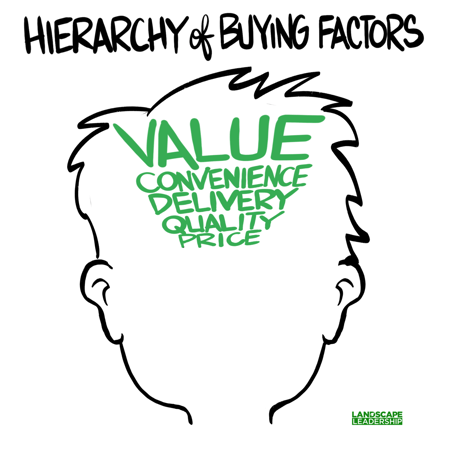Here are 25 Lessons I've Learned About Pricing Lawn and Landscaping Services Over the Past 25 Years
 Author: Chris Heiler
Author: Chris Heiler
 Boy, I really dated myself with this article's title. And, thankfully for you, have made many, many mistakes related to pricing lawn and landscaping services over these 25 years for you to learn from.
Boy, I really dated myself with this article's title. And, thankfully for you, have made many, many mistakes related to pricing lawn and landscaping services over these 25 years for you to learn from.
You're welcome :)
I tried to group these insights into three buckets for easier consumption.
First, my biggest insight: While pricing is the most important factor related to your company's profitability, price is not the most important factor when it comes to making a sale. That should be good news.
Here are 24 more...
On buying factors and the buyer's experience
- Price is more important in the mind of the seller than it is in the mind of the buyer.1 The best salespeople on the planet understand this.
- Price is almost never the primary reason why anybody buys anything.2
- Convenience trumps price. I bet I can price myself 15 to 20% higher than you, and with a superior buying experience for the customer, I will still close at a higher rate.
- Price makes a statement about credibility. Most of us have a gut feeling that price intrinsically has something to do with the quality and value of the product or service that we are buying. Therefore, more people actually buy on the basis of the price being high than those who make a purchase on the basis of the price being low.3
- If you are pricing higher than most of your competitors, you are most likely not losing sales based on that higher price, but instead on the fact you’re not talking about price early enough and confidently enough.
- If your customers are asking for line item and unit pricing then you haven't built enough trust and value during the sales process. Also...
- If you are offering line item and unit pricing in your proposals without your customers asking for it, you are handicapping yourself for no reason. You've commoditized yourself.
- Price for the customer, not yourself (i.e.- the business owner). As a homeowner I'll pay $75/month for a green, weed-free lawn. Don't try to sell me 7 applications for $129 each. I want to pay for lawn care service just as I pay for my gym membership, Netflix, etc...
- Offer options as much as possible, whether you're selling lawn care, design/build, or commercial maintenance. You don't always know what type of buyer you're dealing with. Offering three options allows you to price for the small percentage of "price shoppers" and the "I-want-the-best-of-everything shoppers"... and everyone else in between.
- A delivery problem (i.e.- service) is virtually always the trigger event that causes loss of a sale to an existing customer.4 Not price.
On pricing and positioning
- How you price your landscape services needs to align with your positioning. If you've positioned your company around an expertise (ex.- permaculture, arboriculture, etc.) then you must charge a higher fee for that expertise, otherwise you won't be perceived as the expert.
- The less you offer (i.e.- the more specialized you are) the more you can charge.
- As you move up market or down market, your pricing also needs to move, which makes it very difficult to serve both ends of the marketplace.
- If you regularly complain about competitors underpricing your company then you have a positioning problem, not a pricing problem. You simply haven't distinguished yourself from your competitors in the mind of your prospects.
- Bottom line: You need a compelling unique selling proposition (USP) to justify charging higher prices than your competitors.
On raising (and discounting) prices
- You could probably increase your rates 10 to 15% right now and not feel any blow back from customers or prospects.
- The key to raising prices is, 1) having happy clients who see you getting them results, 2) a strong sales pipeline and, 3) several months to implement the transition.5
- Raising prices is okay. Customers often expect it. What is most important is how you communicate it.
- You should be raising your prices consistently year over year or at least every couple of years. Otherwise, your customers get comfortable and feel entitled to the rates they've been paying for the past five years. This is when you get blow back: "After five years you just now realized you haven't been making any money on us and need to raise your prices?!?!"
- Letting go of a legacy client because they don't want to pay your higher rates is okay. In fact, it's the only way to thrive.
- If you limit your production capacity (in contrast to "growth-at-all-cost") you'll have more courage and confidence asking for the price you truly want for your professional service. The virtues of "being exclusive" will present themselves.
- Winning at business is a game of margins, never a game of volume. The quickest way to increase your margins is to raise your prices. The quickest way to increase your volume – and go out of business – is to discount your prices.
- If you are competing against a company who is regularly cutting their prices then they most likely need cash flow because they are going broke. Let them. Don't play the same game.
- On that rare occasion when you can justify offering a discount to a customer, be sure they are aware that you gave them the discount and for what specific reason. Don't let a discount appear to be arbitrary; or the customer's idea. Make it a line item on your invoice.
---
Your pricing strategy can put a profit in your pocket or quickly put you out of business. It's important to think about. I hope some of this insight I've picked up over my years in the lawn and landscape industry helps you in some way, big or small.
If you want more candid insight like this please consider subscribing to our blog. We've reached nearly 5,000 subscribers! Just add your email address to the form below and we'll send you new articles when we publish.
References:
1-4: How to Sell at Higher Margins Than Your Competitors, Steinmetz and Brooks, page 12-22
5: How to Raise Your Prices by 50%, Karl Sakas




